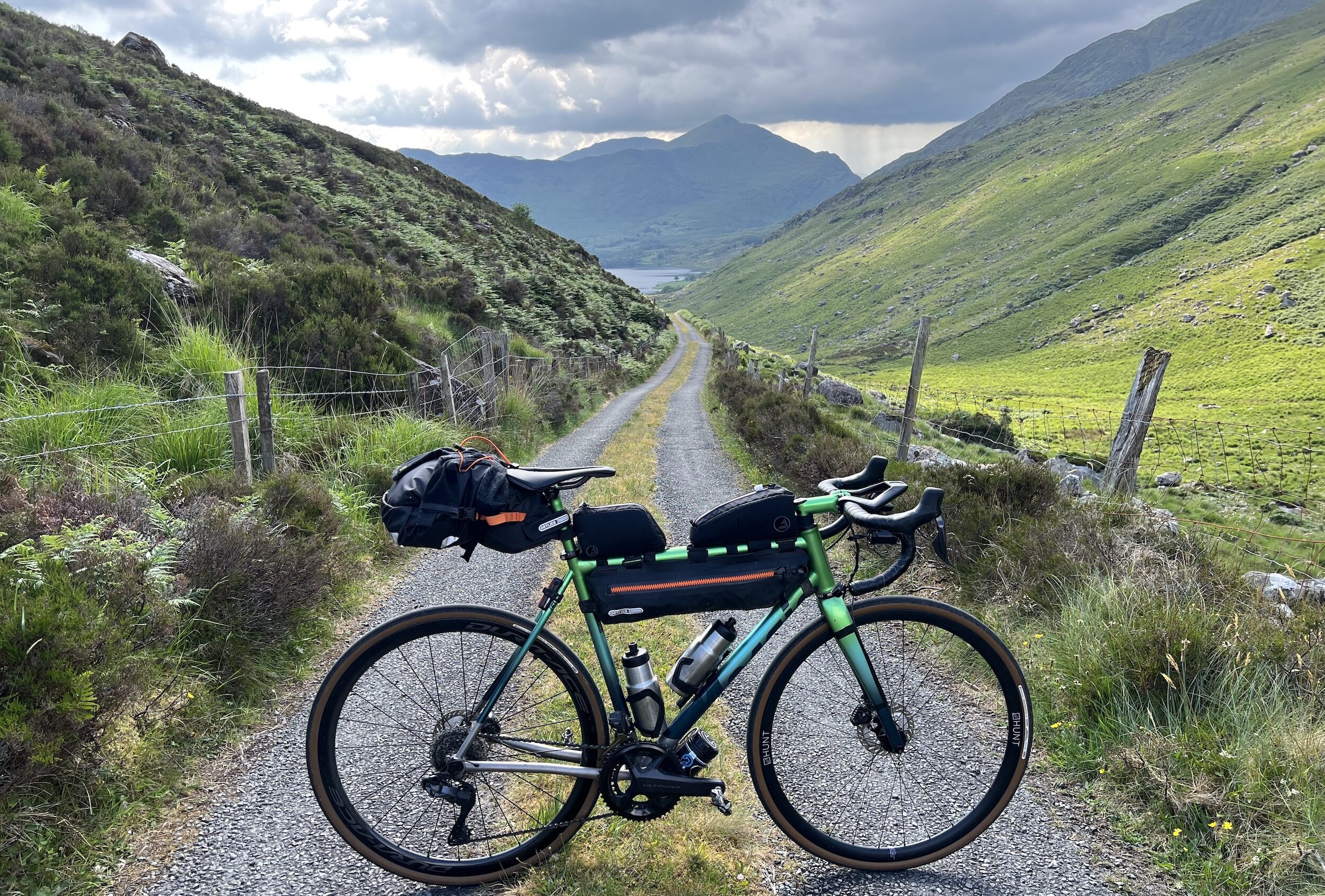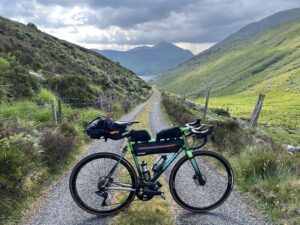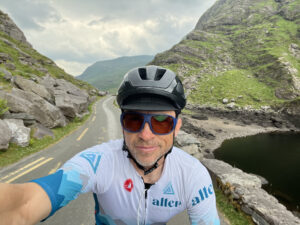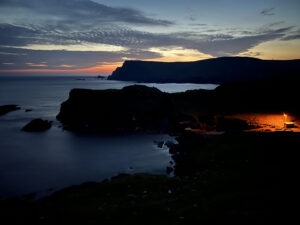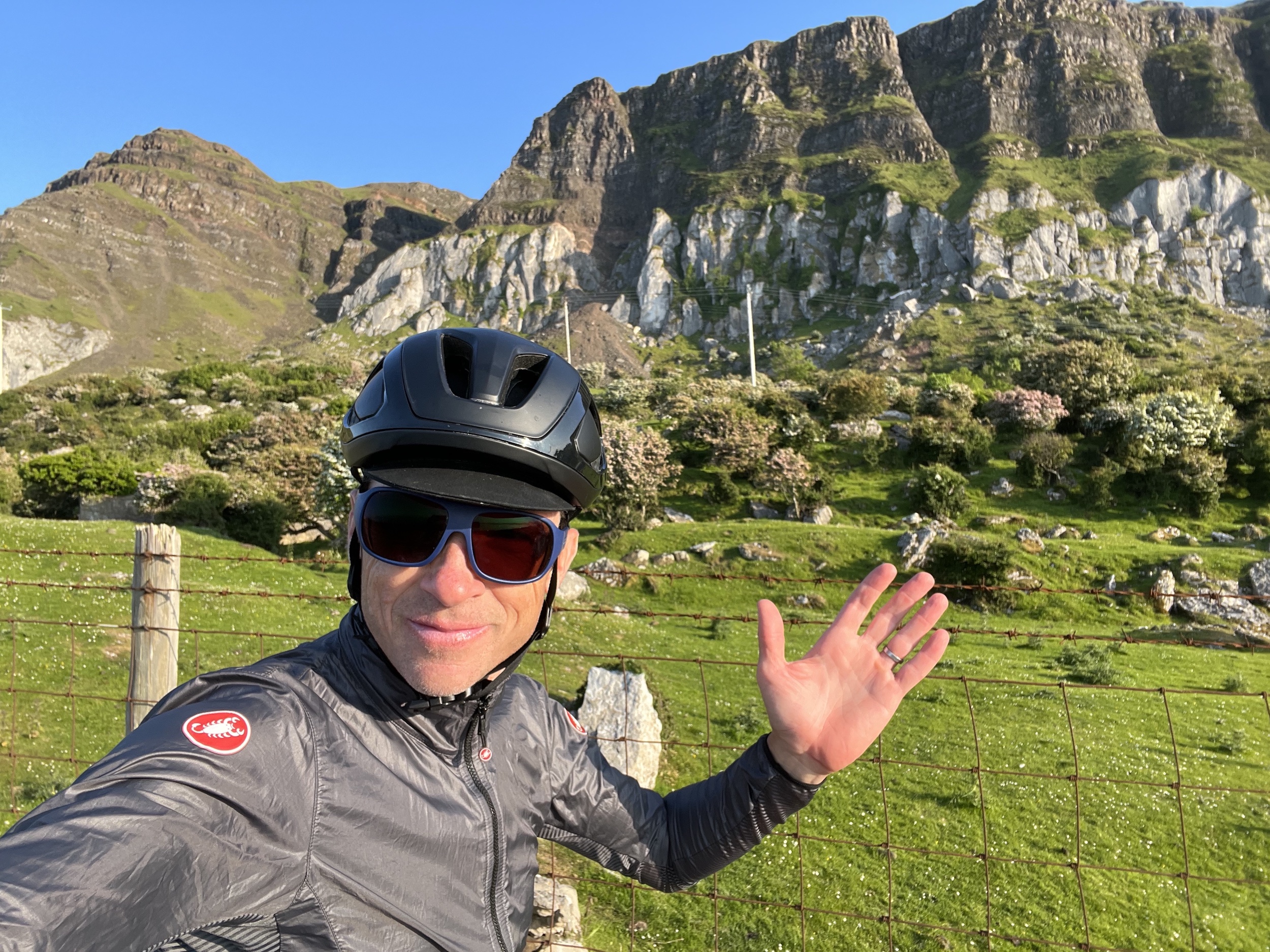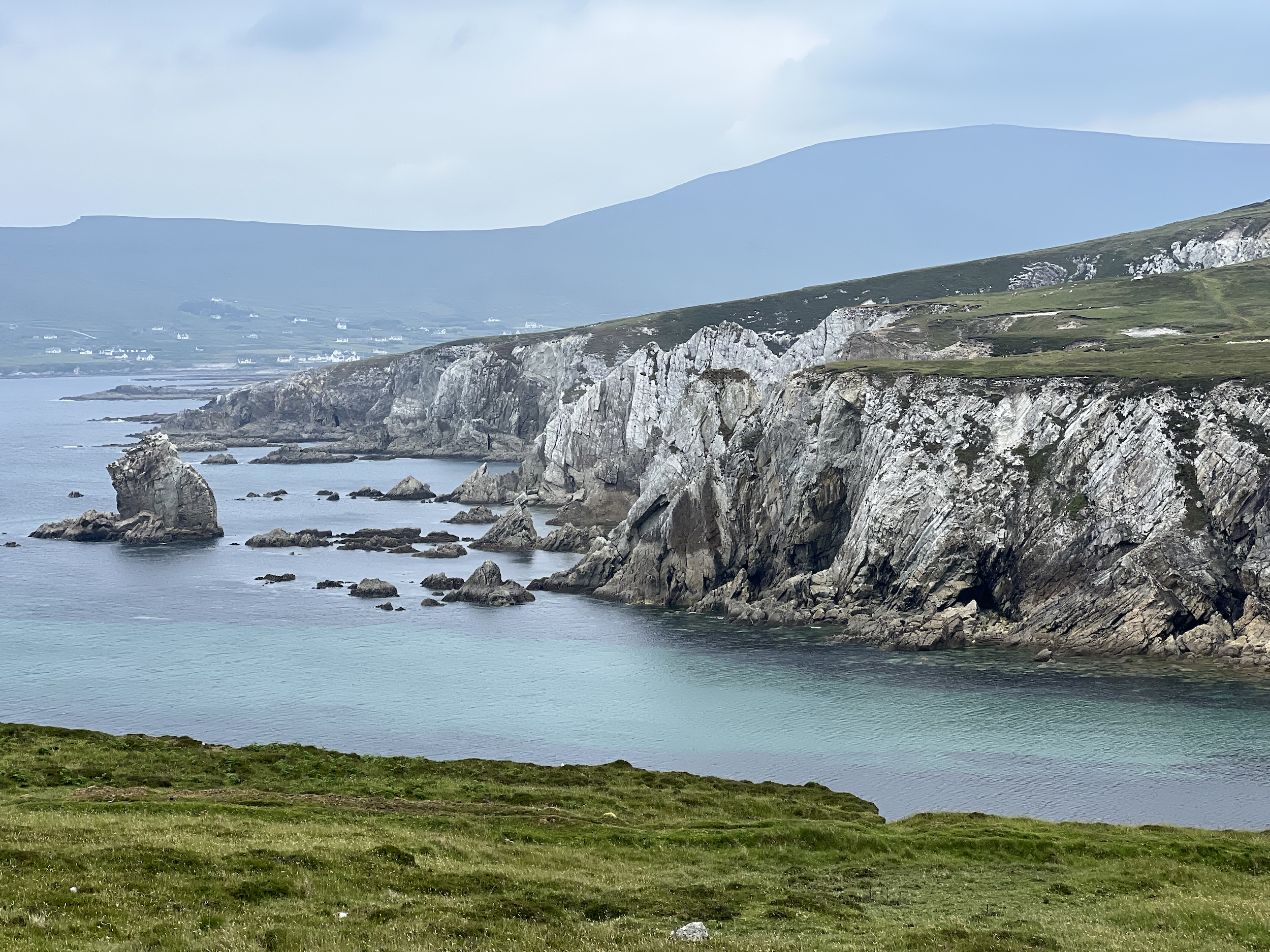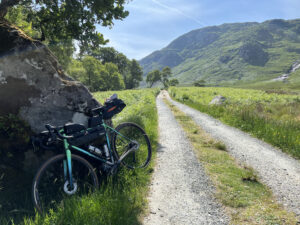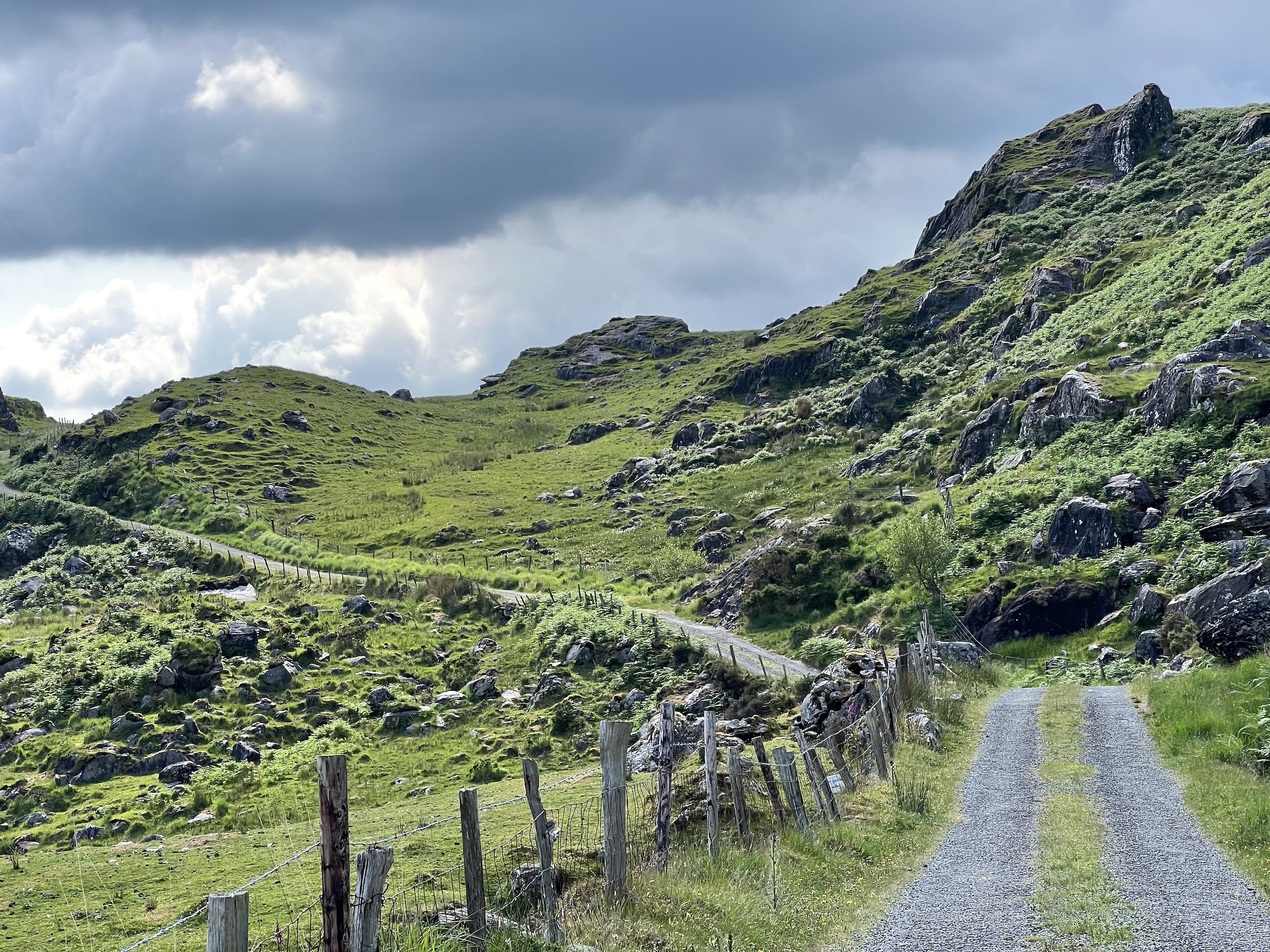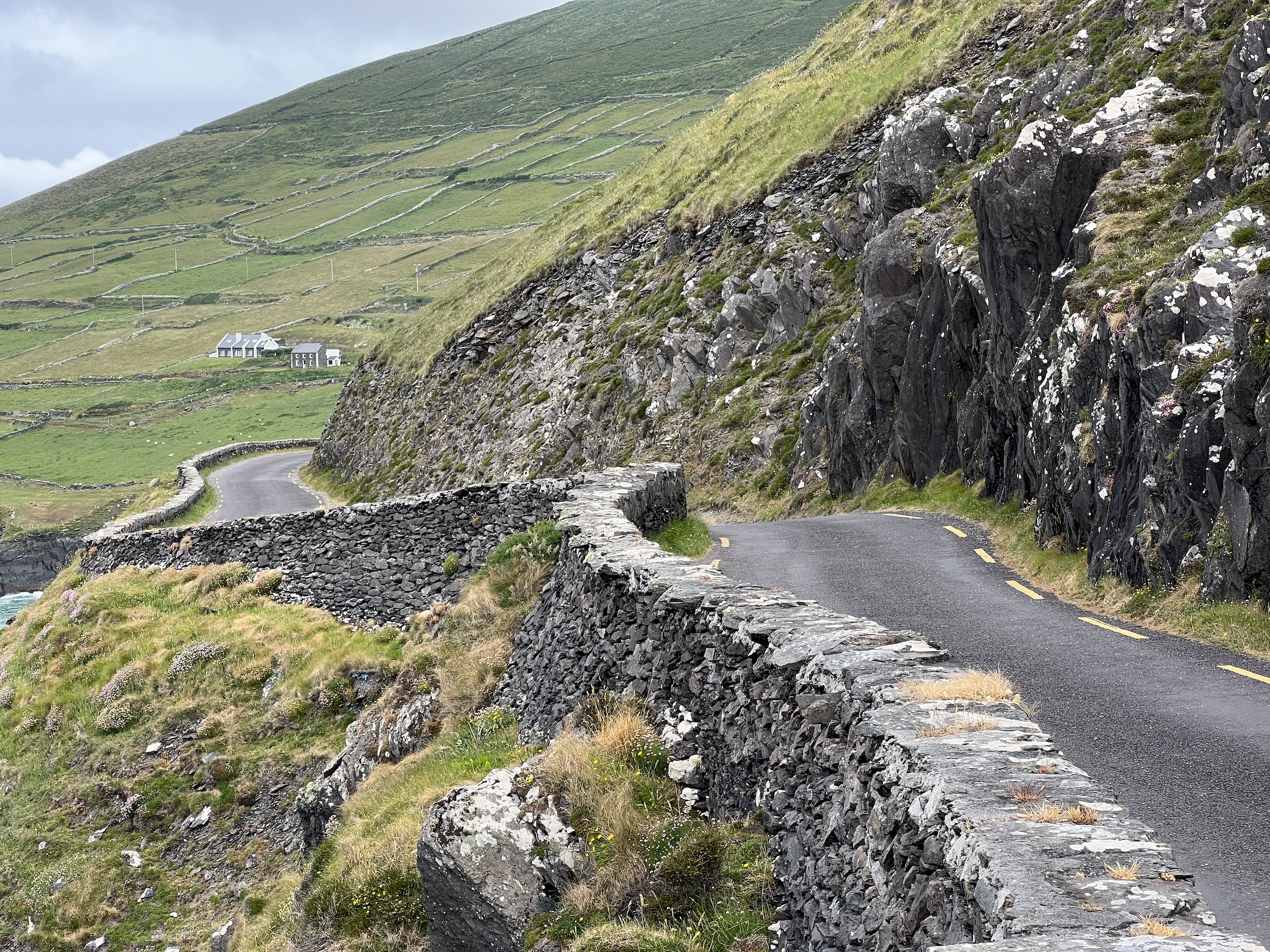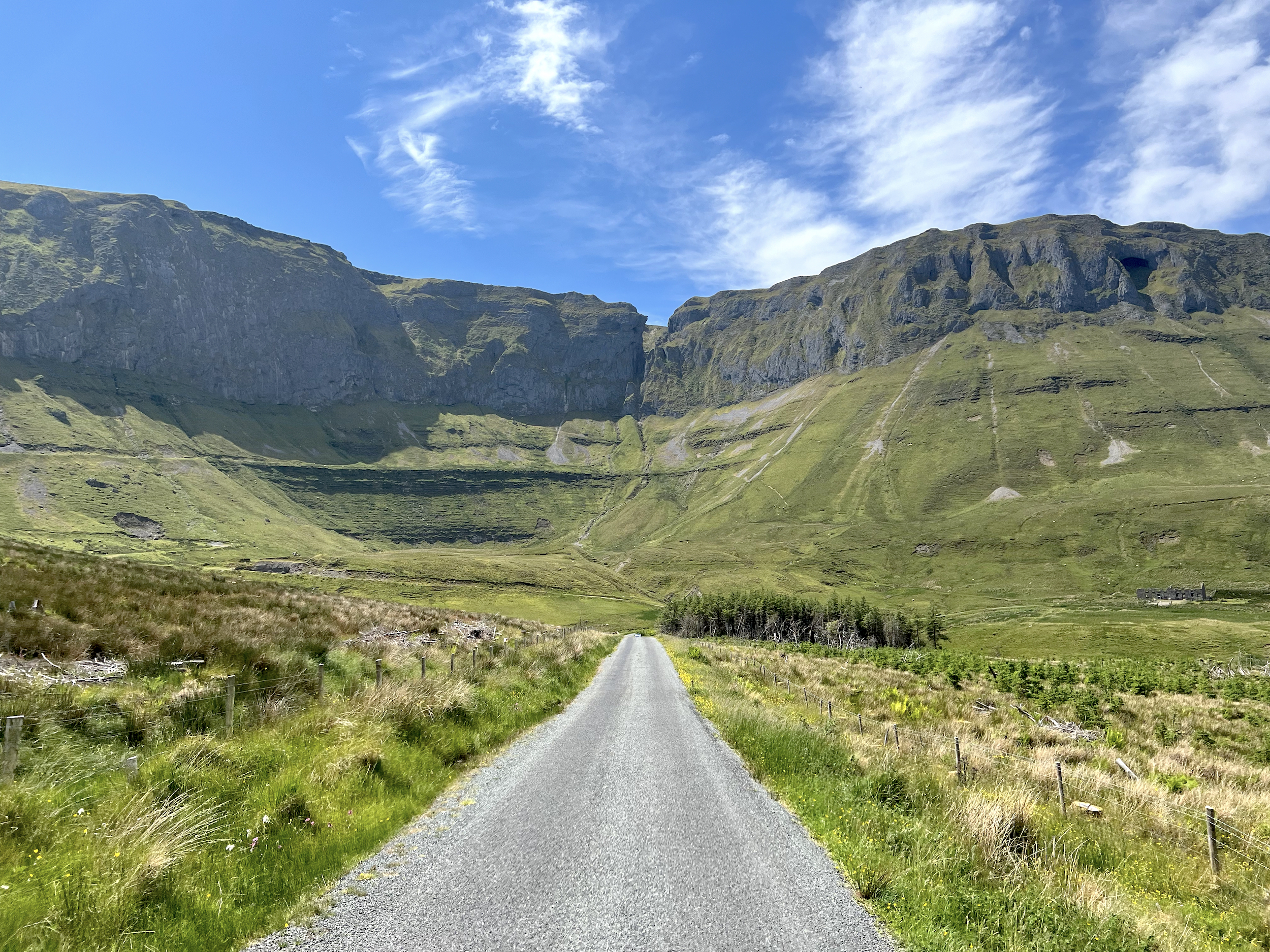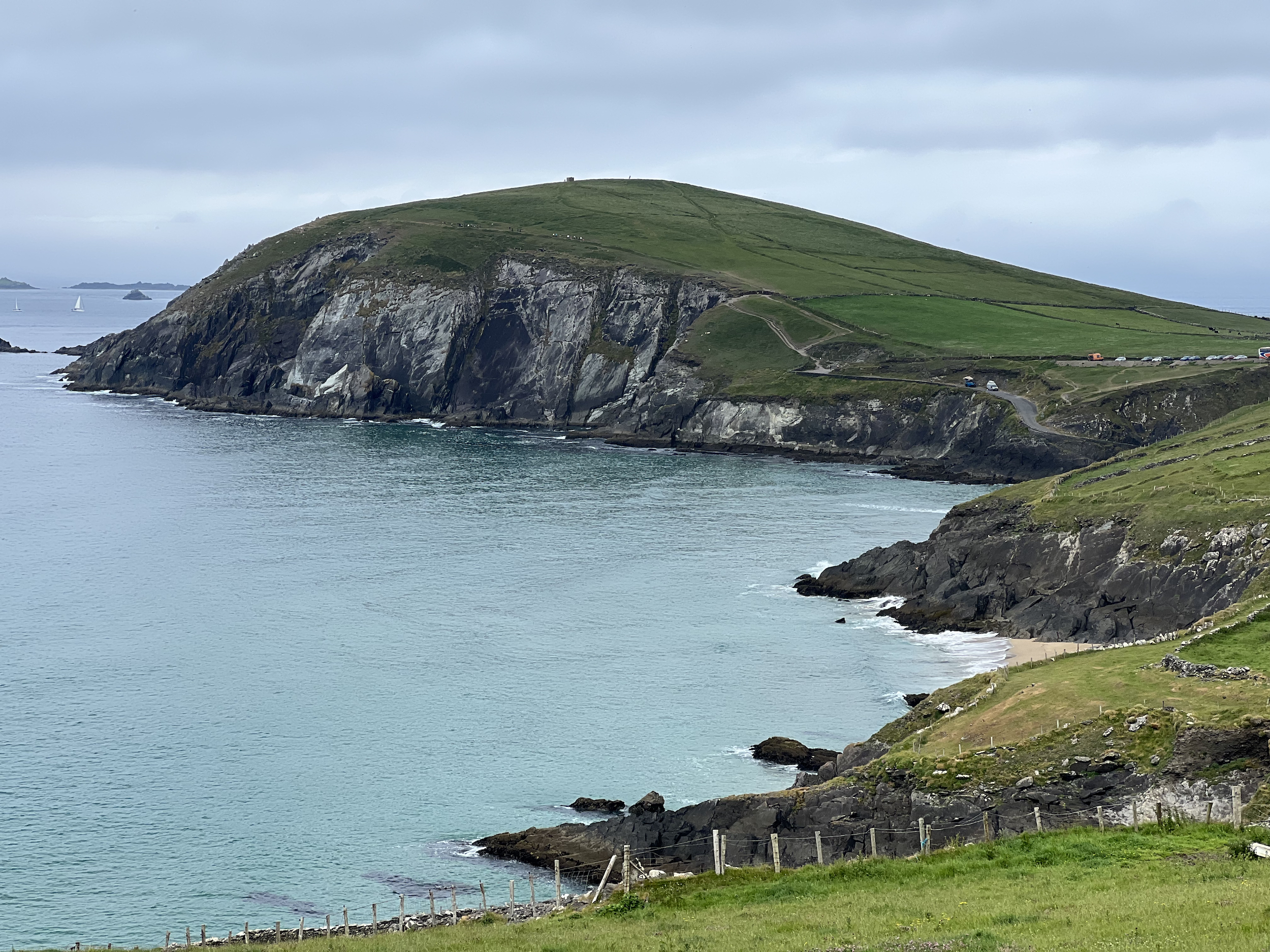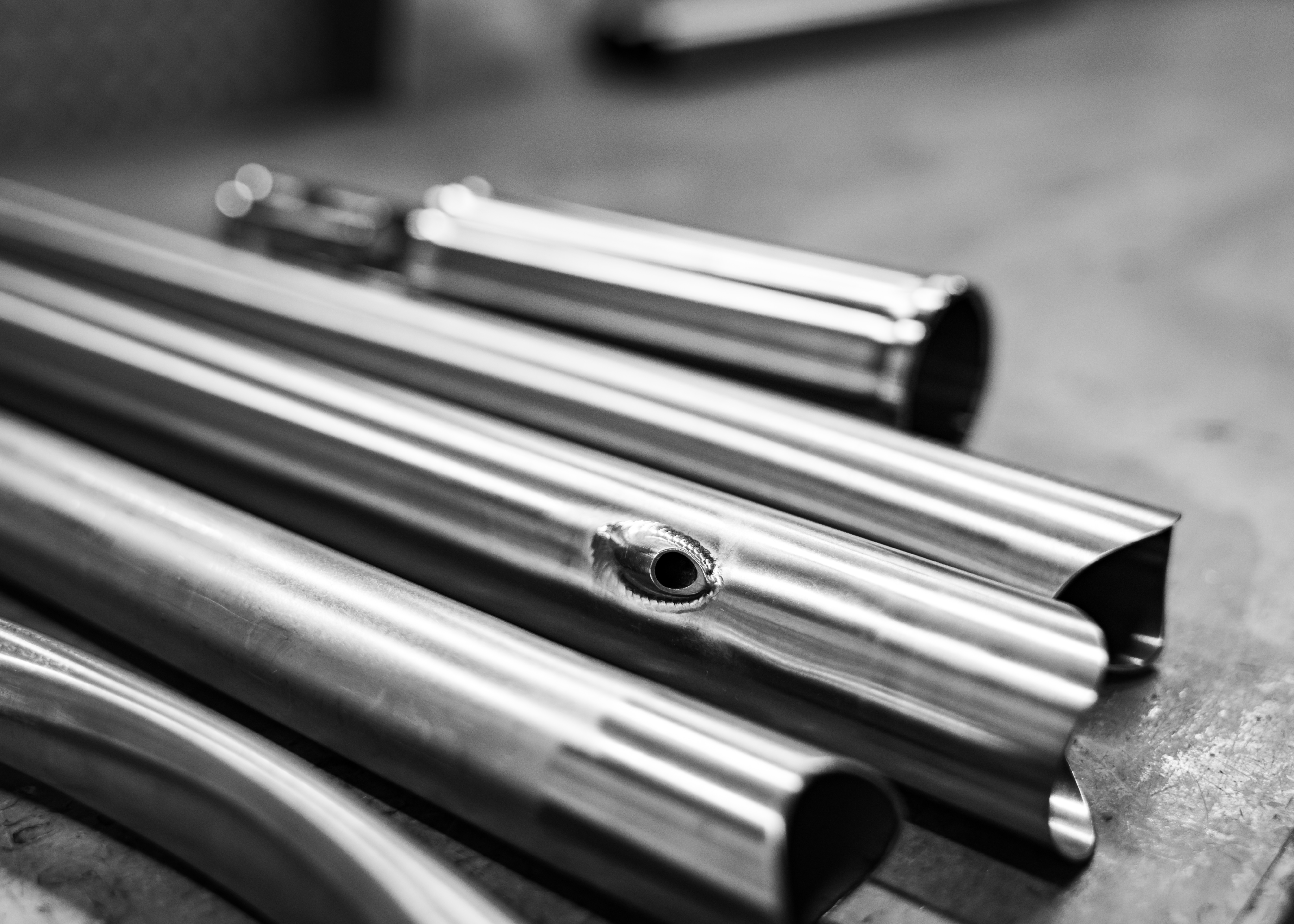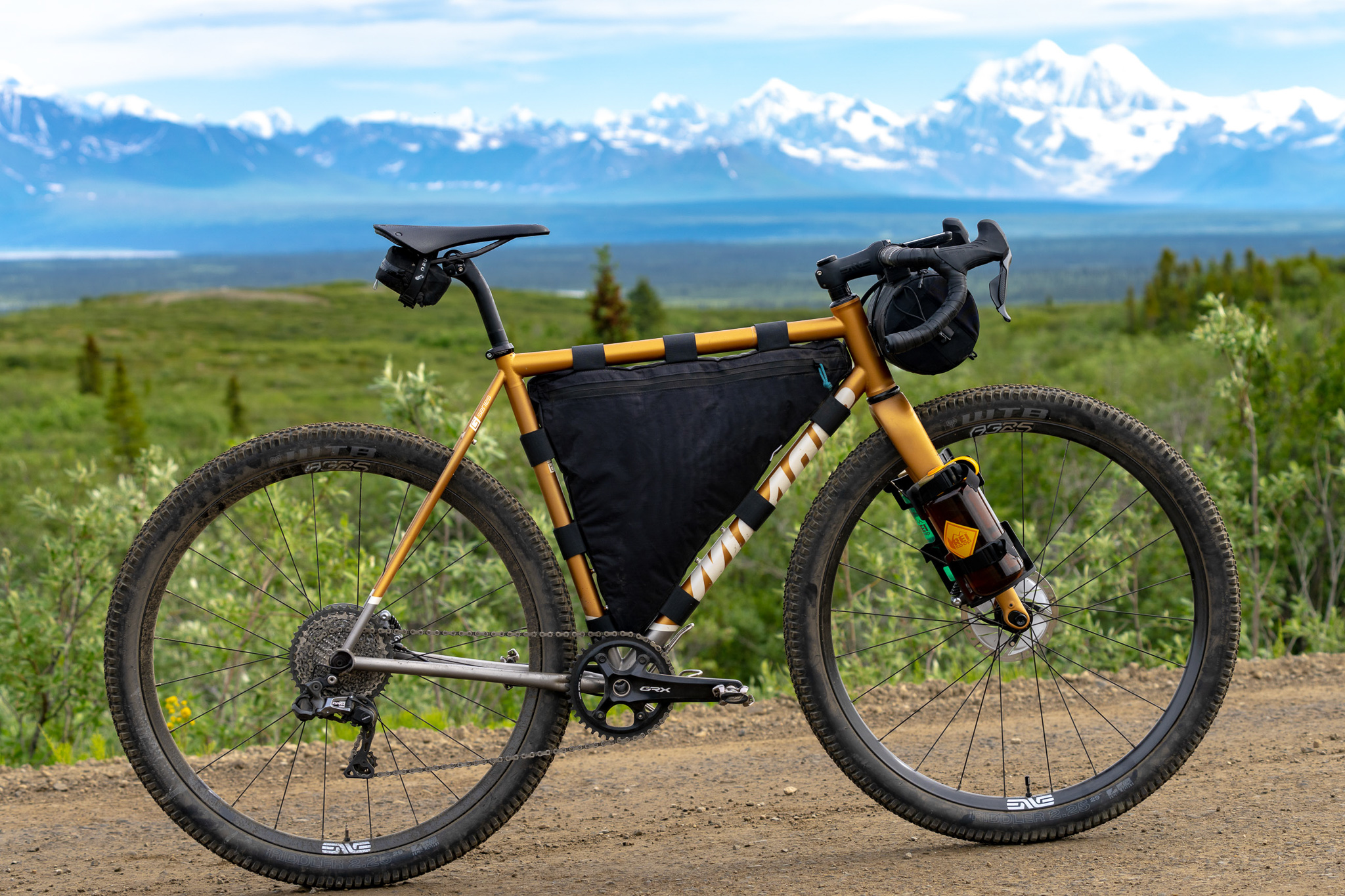Adventure Journal: My First Bikepacking Race Was Agony. When’s the Next One?!?
Chris Case is a journalist, adventurer, and founder of Alter Exploration, guiding cyclists on transformative journeys in some of the world’s most spectacular locations, including the Dolomites, Iceland, Piedmont Alps, and Colorado. Formerly, he was the managing editor of VeloNews magazine and the editorial director for Fast Talk Labs. He is proud to be a Mosaic Cycles ambassador.
I sat on the curb near the slopes of Croagh Patrick, a sacred mountain in western Ireland, phone in hand, Googling “car rental Westport Ireland.” The pain in my knee had become insufferable. I didn’t see the point in causing permanent damage, for some fiction of glory, after riding a long way through a foreign country.
But quitting here, in the middle of a self-supported bikepacking race, on the rural side of a rural country, meant one thing: riding my bike somewhere. It was Sunday. And Sundays in Ireland aren’t for being saved by taxis or rental cars.
Just then, another competitor whom I’d previously chatted with rode past. “I need to get moving,” I thought. I took off my leg warmers, gingerly mounted my bike, and started pedaling again. When I caught Andrew, we chatted nonchalantly. Speed was not the objective for either of us at that moment.
Thirty minutes later, a miracle had taken place (or at least the miracle of wishful thinking): I didn’t notice my throbbing knee—as much. Maybe. I reasoned that if it got as painful as it had been again, I’d stop. Call it quits.
It never did. Disaster averted, I cautiously rode on for another 160 miles that day.
The TransAtlanticWay, which roughly hugs the countless peninsulas and spits of land along the western shores of Ireland, is like most bikepacking races. There’s a start, a finish, and a fixed route everyone must follow. It’s up to each participant to do so, self-supported, under their own power, as fast as he or she can. At TransAtlanticWay, we had the option of a long course, measuring almost 1,500 miles, and a short course of about 1,000 miles.
Because I’m foolish, arrogant, and/or masochistic, I chose the long course. While my riding style and physiology are best suited to steep climbs in the Dolomites, in recent years I have been drawn to rides and events that allow me to explore the edges of my physical and mental capabilities.
I take on these challenges not because of what they take from me, but because of what they give. Each event is an experiment—and, no matter the outcome, experiments always lead to discoveries. And I also just like to move through wild places under my own power.
On the morning of the race, I gathered with 80 like-minded riders near the Peace Bridge in Derry, Northern Ireland. After slowly rolling together in a neutral start along the banks of the River Foyle, we were released, heading northwest toward Malin Head, the island’s northernmost point.
Some of us were riding too fast. Some of us were hesitant to draft—it’s not allowed in bikepacking, but it’s unavoidable when 80 riders get together. Slowly but surely, we all settled in to what we reasoned was a sustainable pace, knowing that we all had a very long way to go.
After 21 hours of pedaling through craggy County Donegal, the dim light of a far northern summer night faded to black. I decided I might try to take a nap. I slowed to a crawl, which wasn’t hard to do on this deserted, precipitous pitch of chip-seal road on Ireland’s wild Atlantic coast.
Scanning the dark with a single beam of dynamo-powered light, I looked for the least lumpy patch of grass. Thankfully, the night was dry, and the stars were magnificently radiant. But, really, all I cared about were the lumps, or lack thereof.
After several indecisive moments, I reasoned that the potential roadside sleeping spots were all going to be about the same. I just needed to pick any spot, throw down the bivy, brush my teeth—oh, how nice it feels to cleanse your mouth after gobs of sugary snacks and gallons of sweet liquids—and snooze.
I fumbled with fatigued hands to remove bivy and sleeping bag from my seat pack. I tucked in. But slumber played coy. I couldn’t sleep. I felt restless. I tossed, I turned, I got hot from the frustration. It wasn’t a hard choice to get up and ride on into the night. After all, this was a race. The clock was ticking.
In the eerie stillness, with only the crashing Atlantic Ocean for company, time ceased to exist. I just kept turning the pedals, and the bike kept lurching forward. It took another 15 hours before I decided to try and sleep again. I was filthy from sweat—despite Ireland’s reputation for upside down rain, it was experiencing a heatwave, and sunblock was more important than Gore-Tex. To the sweat stuck a thick layer of road grime, bugs, and the remnants of “meals.
I could try to bivy again. Or, I could treat myself to a bed. The choice—call me soft—was easy. I found a cheap room in a student housing complex in Sligo, 367 miles, 28,000 feet, and 36 hours from where I started in Derry, where I collapsed into a puddle of my own filth.
I was so empty, I walked in my cycling shoes to a nearby gas station where I found a tub of yogurt and some gravel and cardboard masquerading as granola, ate it, then passed out around 7pm. There were no dreams. When I woke at 3:30am, I could think of nothing better to do than don a dirty chamois and do it all over again.
I was off to a strong start, already feeling transformed. There was the good: I had watched the sunrise and the sunset while riding a bike along the crumbling cliffs of a magical island. The bad: Pains of all kinds were popping up over my body like weeds after a summer rain. And, as yet, no ugly.
In the process, I fulfilled two of my three goals for the race—to complete my longest ride ever, and to ride through the night. For me, that was reason enough to sacrifice a little comfort for eternal satisfaction. Sure, it was arguably an idiotic way to start a bikepacking race. I didn’t mind the idiocy, because I wanted to start with a bang. The detonation was deafening.
Out there on the narrow roads of Ireland I found moments of agony, mental and physical. I dug myself into this hole. Now I seemed to be pulling the dirt down on top of myself.
My general mood and well-being deteriorated. I ceased being able to find a comfortable position on my bike. Shifting on a saddle for 18 hours a day leads to many things, none of them productive.
For a week straight, I persuaded myself to keep plodding along. I spent countless hours persevering through various pains, fatigue, hunger, and even boredom. I spent countless hours perseverating on the thought that I wasn’t always having fun. I spent gobs of energy convincing myself that I just needed to pedal another hour. Another hour. Another hour.
For all our intelligence as a species, humans’ underlying lizard brain is not so bright, and therefore easily tricked into the gimmick of chunking, or breaking big things into small pieces in order to manage the magnitude. I did this over and over and over again. It was exhausting. Without it, though, I’d still be lying in a roadside ditch. Grit became my best friend.
The routine repeated itself. Wake, eat, ride. Ride, eat, ride. Gawk at the scenery. Give thanks for the opportunity. Ride, eat, sleep.
After 7 days and 6 hours, I crossed an imaginary finish line to exactly zero fanfare when my Garmin said “end of route.” I only knew I was in the right place when I saw another beleaguered cyclist draped on a couch in a nearby apartment. The place had been rented as the finishing “place.”
There, on the outskirts of the village of Kinsale in County Cork’s Irish Riviera, I was consumed by a profound sense of satisfaction from completing something I didn’t know I could do—and only a few days earlier didn’t think I should do given the knee pain I was feeling.
I fought through many disheartening moments on many lonely roads—it wasn’t anything the race did or that Ireland did, it was simply a function of what I felt compelled to do to get through the event.
Did I enjoy bikepacking across Ireland? Did I hate it? Yes. The answer is a resounding yes. Bikepacking is about traveling through the world under your own power, immersing yourself in a place and culture and learning, lingering, and growing because of it. In contrast to this, bikepack racing curtails opportunities for such an education and enjoyment—at least for me. That is the paradox that leads to the ambiguity.
I believe that challenge is good for us. When we face hardship, we transform. When we utilize resiliency, we improve. I love to explore what can be gained by pushing myself beyond what I know. Of course, we all have a breaking point. I did not break.
Despite moments of torment in my first race, it’s likely no surprise that I’m ready for the next one. I’m nothing but an arrogant fool who firmly believes I can do better next time. Change this, fix that. I want another shot. I want redemption. I want to prove that I can be far less naive the next time around and escape the pain and suffering.
I want to forget the torture as only an ultra-cyclist can: by willingly replacing it with another bout, in a dirty chamois, on the verge of developing insulin-resistance syndrome from consuming vast quantities of sugar-saturated “nutrition” bars, bags of pastries, and cancer-colored drinks.
The only question is: What beautiful setting shall I torture myself in this time?
